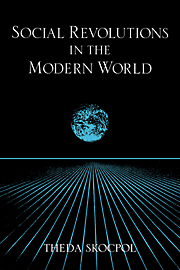Book contents
- Frontmatter
- Contents
- Acknowledgments
- INTRODUCTION
- I DOING MACROSCOPIC SOCIAL SCIENCE
- 1 A critical review of Barrington Moore's Social Origins of Dictatorship and Democracy
- 2 Wallerstein's world capitalist system: A theoretical and historical critique
- 3 The uses of comparative history in macrosocial inquiry
- II MAKING SENSE OF THE GREAT REVOLUTIONS
- III A DIALOGUE ABOUT CULTURE AND IDEOLOGY IN REVOLUTIONS
- IV FROM CLASSICAL TO CONTEMPORARY SOCIAL REVOLUTIONS
- CONCLUSION
- Index
2 - Wallerstein's world capitalist system: A theoretical and historical critique
Published online by Cambridge University Press: 05 June 2012
- Frontmatter
- Contents
- Acknowledgments
- INTRODUCTION
- I DOING MACROSCOPIC SOCIAL SCIENCE
- 1 A critical review of Barrington Moore's Social Origins of Dictatorship and Democracy
- 2 Wallerstein's world capitalist system: A theoretical and historical critique
- 3 The uses of comparative history in macrosocial inquiry
- II MAKING SENSE OF THE GREAT REVOLUTIONS
- III A DIALOGUE ABOUT CULTURE AND IDEOLOGY IN REVOLUTIONS
- IV FROM CLASSICAL TO CONTEMPORARY SOCIAL REVOLUTIONS
- CONCLUSION
- Index
Summary
The Modern World-System: Capitalist Agriculture and the Origins of the European World-Economy in the Sixteenth Century.
By Immanuel Wallerstein. New York and London: Academic Press, 1974.Immanuel Wallerstein's The Modern World-System aims to achieve a clean conceptual break with theories of “modernization” and thus provide a new theoretical paradigm to guide our investigations of the emergence and development of capitalism, industrialism, and national states. This splendid undertaking could hardly be more appropriately timed and aimed. For quite some time, modernization approaches have been subjected to telling critical attacks (e.g., Gusfield 1967; Frank 1966; Bendix 1967; Tipps 1973; Smith 1973; Tilly 1975, chap. 9). They have been called to task for reifying the nation-state as the sole unit of analysis, for assuming that all countries can potentially follow a single path (or parallel and converging paths) of evolutionary development from “tradition” to “modernity,” and, concomitantly, for disregarding the world-historical development of transnational structures that constrain and prompt national or local developments along diverse as well as parallel paths. Moreover, modernization theorists have been criticized for the method of explanation they frequently employ: a historical ideal types of “tradition” versus “modernity” are elaborated and then applied to national cases; if the evidence seems to fit, one assumes that a particular historical instance is adequately explained; if not, one looks for the “chance” factors that account for its deviation.
In the opening pages of The Modern World-System, and in a related essay (also published in 1974) called “The Rise and Future Demise of the World Capitalist System,” Wallerstein unequivocally defines his approach in direct opposition to these features of modernization theory.
- Type
- Chapter
- Information
- Social Revolutions in the Modern World , pp. 55 - 71Publisher: Cambridge University PressPrint publication year: 1994



